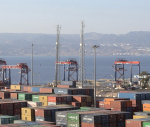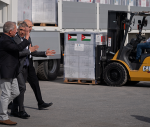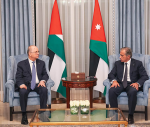You are here
Lifesaving convictions
Jun 02,2014 - Last updated at Jun 02,2014
The plight of more than 200 girls abducted in northern Nigeria is a brutal reminder of just how vulnerable children in Africa — particularly girls — can be. But it is equally important to recognise that this is not a true reflection of modern Africa, and that African leaders are strongly committed to protecting their countries’ children.
Their ability to provide the same kind of protection that children in wealthy countries enjoy requires two key ingredients: partnership and conviction.
That is because even though terrorism is an insidious threat, the biggest risk to Africa’s children is disease, which often can be prevented through routine immunisation.
Indeed, as the world debates the best way to recover the missing girls, another menace is resurfacing: the World Health Organisation recently declared the spread of polio an international public-health emergency, with several African countries now posing an ongoing risk of exporting the disease.
Fortunately, there are immediate and tangible ways to beat polio and a host of other vaccine-preventable diseases that currently claim innocent lives in Africa and beyond.
Moreover, African leaders recognise that the best way to provide children with long-term and sustainable protection is through routine immunisation.
Earlier this month, African leaders meeting in Nigeria’s capital, Abuja, endorsed the “Immunise Africa 2020 declaration”, committing themselves to investing in a healthy and sustainable future for all children in their countries.
Such declarations are important, because it is only through the power of our convictions that we can ever truly bring about positive change. And change is indeed occurring.
Since 2001, there have been no fewer than 140 new vaccine launches in Africa, thanks to local leadership and support from my organisation, the GAVI Alliance, and its partners, UNICEF, the World Health Organisation, the World Bank, and the Bill and Melinda Gates Foundation.
As a result of this kind of work, immunisation coverage in Africa has increased dramatically, from 10 per cent in 1980 to 72 per cent in 2012.
And now, from 2016 to 2020, Africa’s 50-plus countries will commit more than $700 million directly towards the cost of childhood vaccines through GAVI and its partners.
This will make Africa the fourth-largest investor in GAVI, behind only the United Kingdom, the Bill and Melinda Gates Foundation, and Norway.
This kind of commitment signals a shift in development aid away from the traditional model of charity towards one built on partnership.
However, given that African countries already spend billions of dollars on health services, and that the continent has so many other competing needs, investing in vaccines may not always seem an obvious choice.
Norway was in a similar situation in 2003 when, as minister of health and social affairs, I led the effort to ban public smoking.
At the time, there was strong opposition to the ban, and I was compared to the world’s worst dictators.
But I knew that the move would save many lives for years to come, and I was convinced that if I did not act, I would not be doing my job properly. And I was not alone: My Irish counterparts agreed.
As the gains to individuals — and society — became clear, more than 100 other countries followed Norway and Ireland’s lead, and today the number of smokers in Norway has been halved, and nine out of ten people support the ban.
With the benefit of hindsight, some solutions may seem obvious; but it took the power of conviction to make the solution apparent in the first place.
Such is the case now with immunisation in Africa and poor countries worldwide.
These countries’ leaders have already seen what can be achieved with vaccines, and they see further benefits from immunisation in the coming years.
Indeed, since its launch in 2000, GAVI has already supported the vaccination of 440 million additional people, helping to save six million lives.
But now, as GAVI Alliance partners and donors prepare to meet in Brussels this week to map out GAVI’s funding for the next five years, there is a very real opportunity to do more.
With GAVI support, we have within our grasp the chance to double the number of children immunised by 2020, approaching one billion in total and averting the deaths of more than five million lives between now and then.
African leaders have demonstrated their resolve; but, at a time when many donor countries are still struggling to consolidate a fragile economic recovery, it will take commitment and conviction on the part of their leaders, too.
None of us can do it alone, but through partnership we really can help to protect the world’s most vulnerable children.
The writer is chair of the GAVI Alliance Board. ©Project Syndicate, 2014. www.project-syndicate.org












